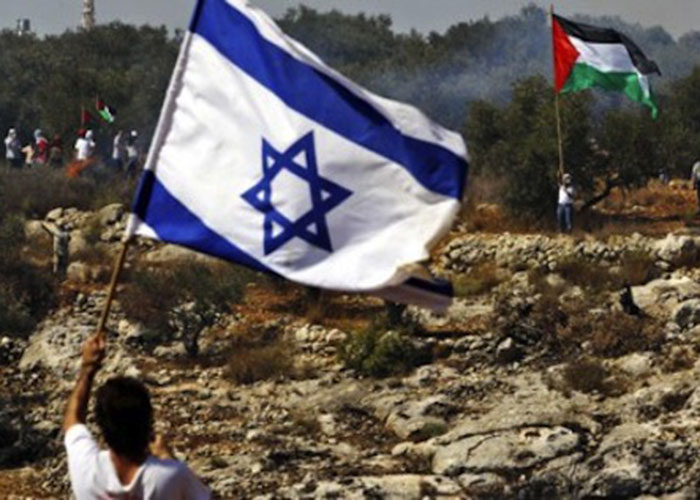- PLO War Strategy. In 1974, the P.L.O., at its 12th National Convention, adopted a “The Strategy of Stages” – to convey the impression of “moderation”, with the Stage I as the establishment of a Palestinian Arab state in areas vacated by Israel. Stage II involved the resumption of the “armed struggle” from an enhanced power base, so as to weaken Israel and prepare the takeover of all Palestine, in Stage III.
- PLO Algeria Potemkin Summit. In 1988, the PLO convened a summit in Algiers, reportedly to launch a state alongside Israel. We dispatched a journalist to cover the session. An AP memo greeted reporters, proclaiming that the Algiers summit would approve UN resolutions 242 and 338 and recognize UN 181 and therefore recognize Israel. Yet the Algiers summit never witnessed any such decisions. Instead, Algiers reaffirmed the PLO platform to liberate all of Palestine, by force of arms.
- PLO Non Peace Accord. Throughout August 1993, Israeli and PLO negotiators hammered out the DOP, the Declaration of Principles, as the basis of a peace accord on the White House lawn on September 13, 1993, signed by Arafat, Abbas, Rabin and Peres. The DOP mandated that Israel and the PLO were to ratify the accord. The Knesset did so on September 25. The PLO executive was set to ratify on October 6. Pinhas Inbari, Al HaMishmar correspondent, flew to Tunis as the Israeli reporter to witness PLO ratification. Yet Arafat greeted Inbari with the news that he could not get a quorum and that no ratification of the DOP would take place. The next morning, PM Rabin’s spokesman confirmed to me that the DOP was indeed not yet ratified and that he hoped that the PLO would eventually ratify the DOP. Yet FM Peres sent a delegate to Tunis to congratulate Arafat on the ratification of the DOP. The Israeli consul in New York issued a statement of thanks to Arafat. To this day, the Oslo accord has yet to be ratified, and the PLO remains in a state of war with Israel.
- PLO Charter remains. A most important expectation of the Middle East Peace Process process was that the PLO would renounce the PLO Charter which mandated Israel’s obliteration. US law went so far as to forbid opening of a PLO office in the US, unless the PLO charter was cancelled. When the PLO convened the PNC to cancel the charter, on April 24, 1996, we dispatched crew to film the event. We engaged a leading expert on Palestinian affairs, Prof. Yehoshua Porat, to evaluate resolutions discussed. Porat had also been a Meretz candidate for Knesset in 1992. Yet the PNC only formed a committee yet never cancelled the PLO charter. We sent the video and protocols of the session to FM Peres and US Ambassador Indyk. Porath conducted a press conference to explain to the world that the PLO Charter was not annulled. Yet Peres and Indyk congratulated Arafat on the cancellation of the PLO Charter, which enabled Arafat to enter the US a few days later and open a PLO office in DC, which has remained open ever since. Within six months, both the Israeli and US governments acknowledged that the PLO covenant remained unchanged. In December, 1998, President Clinton attended another PNC session to cancel the PLO covenant, but PLO spokesman Yassid Abu Rabu informed the world that the PLO Covenant was not cancelled at that event.
- PLO Coordination with Hamas remains. When Arafat received the Nobel Peace Prize, I asked the PLO leader at his triumphant press conference if he would crush Hamas. His answer said it all: “I do not understand the question. Hamas are my brothers”. Far from fighting Hamas, the Palestinian Authority has been financing 40% of the Hamas regime budget in Gaza and providing Hamas with weapons since May, 1995. It is understood that any election in the Palestinian entity would wind up in in a Hamas victory – and result in terror rockets against all parts of Israel not only in the Western Negev.
- PLO Claims all areas lost in 1948 . On its maps, the PA defines all Israeli communities built in place of pre 1948 Arab villages as “illegal settlements”. No compromise is possible when PLO theology insists that all of Palestine is never to be shared with others.
- PLO relegates descendants of refugees from the 1948 to one place of residence – in the 59 “temporary” UNRWA refugee camps, under premise of their “inalienable Right of Return” to villages lost in 1948 . Even when the Palestinian Arab city of Rawabi was created, with open space that could accommodate thousands of Arab refugee descendants who now live in teeming overcrowded conditions, the PA will not allow the Arab refugees to dwell in Rawabi.
- The PLO has fostered a new war education curriculum to motivate every school child to kill Jews who live in Israeli communities that replaced Arab villages lost in 1948.
- PLO demands Jerusalem, all of Jerusalem. “East Jerusalem” is never mentioned as their demand in the Arabic language. “Holy Jerusalem” is the term used. Even Salem Fayad, described as a moderate PA leader, mentions Jerusalem, all of Jerusalem, in his master plan for a Palestinian state, not relinquishing the demand for full Arab sovereignty over the Jewish quarter, the Western Wall and the Temple Mount.
- The PLO has established a PA regime devoid of human rights and civil liberties, which has evolved into a totalitarian dictatorship. Those who care about Palestinian human rights should ask where Palestinian human rights will best be protected…under a PLO dictatorial state of corruption – or as a protected minority in Israel?
A guide to the ten principles of the PLO two stage solution, not the two state delusion









